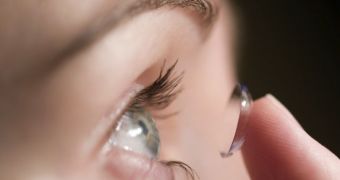18-year-old Ashley Hide from Florida has recently come fairly close to losing her sight after an eye-eating parasite set up home on her contact lens and began feeding on her cornea.
The teenager says that, when the bacteria first started growing on her contact lens, she experienced blurred vision, sensitivity to light, watery eyes and pain. Because of this, she asked for help from an optician.
Still, it did not take long before the parasite's feeding on her cornea caused the girl's eye to become red and inflamed.
Finding themselves unable to figure out what was harming Ashley Hyde's eye, the doctors in charge of looking after her decided to resort to extreme measure. Thus, they both scraped her eye and drilled into it.
“They did multiple cultures where they scrape your eye. One time, they had to drill into my eye. It was really nasty,” the teenager reportedly said.
The samples they managed to collect in this manner allowed them to pin down the underlying cause of said peculiar symptoms: an acanthamoeba infection. Daily Mail explains that acanthamoeba is basically a parasite that can only be observed by means of a microscope.
Despite its mainly inhabiting water sources and soils, the parasite can affect humans either by creeping into skin wounds or by being breathed in.
As Ashley's case proves, the parasite also feels comfortable living on people's contact lenses.
Following their figuring out what was damaging the teenager's eye, the doctors told Ashley that she must undergo several months of treatment in order to get rid of the parasite.
Dr. Adam Clarin wished to stress the fact that those who wish to avoid undergoing a similar experience would do best to change their contact lenses on a daily basis.
“There is nothing safer or healthier than throwing out the lens every day and starting with a new one the next day,” Dr. Adam Clarin said.

 14 DAY TRIAL //
14 DAY TRIAL //